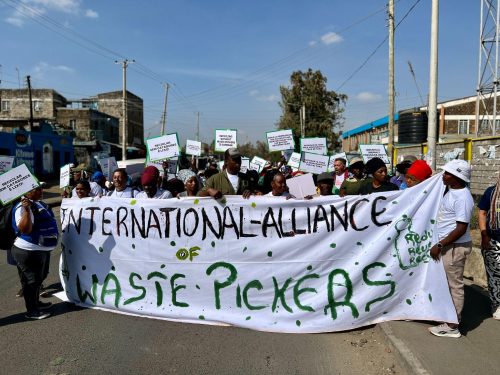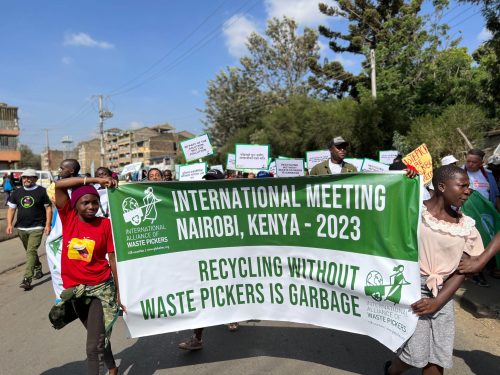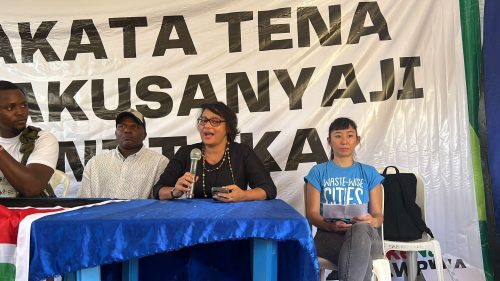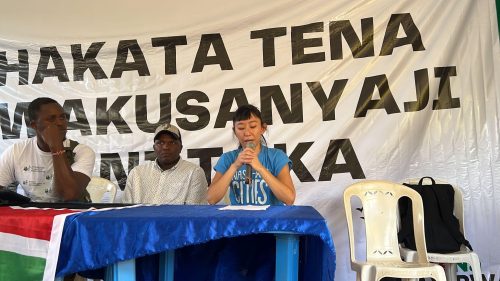
Waste pickers during their march around the Dandora Dumpsite, in Nairobi, Kenya, to commemorate the International Waste Pickers Day
Waste picker representatives from 19 countries gathered in Nairobi to participate in the International Alliance of Waste Pickers Coordination Meeting. The general objectives were to discuss the interim work towards their Elective Congress; to promote connection and trust-building among waste pickers from the different regions, and to celebrate the International Waste Pickers Day on March 1st with a march around the Dandora dumpsite.

Waste pickers march around the Dandora Dumpsite, in Nairobi, Kenya, to commemorate the International Waste Pickers Day
March 1st commemorates waste pickers who lost their lives on this day in the Universidad Libre De Barranquilla Colombia in 1992. 31 years ago, waste pickers were invited to the university under the pretext of receiving recyclable materials. Once inside the campus, they were beaten and shot to death, and their bodies were to be used for research and organ trafficking.
During the march, that welcomed hundreds of waste pickers and allies, they highlighted that the International Waste Pickers Day is a day to memorialise the struggles of waste pickers for recognition, and dignity across the planet. It is the day to mark the achievements of waste-pickers associations, organizations and unions and the International Alliance of Waste Pickers. On this International Waste Pickers Day and through their march, waste pickers demanded the following from the national and county governments in Kenya and governments around the world:
- Recognise the occupation of waste-pickers and recognise waste-pickers’ right to access waste.
- Waste-pickers should be paid fair and better prices for recovering and reclaiming recyclable and reusable materials.
- Affordable, comfortable and quality housing for all waste-pickers and their families.
- Government should give waste management tenders to waste-pickers, run enterprises and organizations.
- Health and life insurance for all waste-pickers and their families.
- The dumpsites should not be closed before providing sustainable and regularised livelihood opportunities to waste-pickers.
Post the march, the Kenyan National Waste Pickers Association held a press conference with the participation of government officials, leaders of the IAWP and representatives of the media at Dandora Community Centre. Jyoti Mathur-Filipp, Executive Secretary, Secretariat, INC for Plastics Pollution and Nao Takeuchi, Waste Management Expert from UN-HABITAT were present at the press conference and addressed the almost 200 waste pickers that attended the event.
In the video, by order of appearance:
- Yvonne Norville, Sure We Can USA
- Samuel Le Coeur, Amelior France
- Kulsum Begun, Bangladesh Waste Picker Union (BWPU)
- Leonor Larraburu, FACCyR Argentina
Other leaders who spoke during the conference:
- Friday Gabriel Oku, Association of Scrap and Waste Pickers in Lagos (ASWOL)/ NASWON
- Sushila Sable, AIW and Parisar Bhagini Vikas Sangha (PBVS)
- Harouna Niasse, L’association des Recuperateurs et Recuperatrices de Mbeubeuss (Bok Diom)
- Yenny Del Carmen, Movimiento Nacional de Recicladores de Panamá (MNRP)
- John Chweya, Kenya National Waste Pickers Association
- Severino Francisco Lima, Movimento Nacional dos Catadores de Materiais Recicláveis – MNCR Brasil
- Barbie Weber, GroundScore USA
Alejandro Antonio Mena, Asociación Movimiento Nacional Recicladores de Chile (ANARCH) - Shanti Tamang, Samyukta Safai Jagaran (SASAJA)

Jyoti Mathur-Filipp, Executive Secretary, Secretariat, INC for Plastics Pollution, addresses Waste Pickers during the press conference for the International Waste Pickers Day in Nairobi, Kenya.

Nao Takeuchi, Waste Management Expert from UN-HABITAT, highlights the importance of waste pickers for the informal waste sector.
As part of the week’s activities, waste pickers also visited the Dandora dumpsite, which covers approximately 70 acres, and is the destination of about 1,100 tonnes of solid waste generated daily by Nairobi’s population. The dumpsite sustains the livelihoods of approximately 3,000 waste picker families. They recover plastic, food, clothes, paper and bottles that they can sell for much-needed income. “One of our biggest challenges here is access to health and access to education” says Winnye and Joyce, National Organizing Secretaries of Kenyan National Waste Pickers Welfare Association (KENAWPWA).
Tweet













